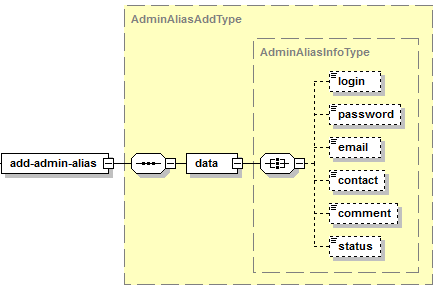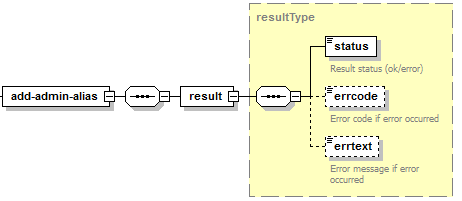Creating Additional Administrator Account
The add-admin-alias operation allows you to create an additional administrator’s account on your server.
Request Packet Structure
A request contains the add-admin-alias operation node:
<packet>
<server>
<add-admin-alias>
...
</add-admin-alias>
</server>
</packet>
The add-admin-alias node is presented by the complex type
AdminAliasAddType (plesk_server.xsd) and structured as follows:

Note: The interactive schema navigator for all request packets is available here: http://plesk.github.io/api-schemas/1.6.8.0/agent_input.svg.
The data node is required. It contains a collection of settings
that will be set for the filtered user accounts. Data type:
AdminAliasInfoType (plesk_server.xsd). This node contains the
following nodes:
- The login node is required. It specifies the login of the additional administrator. Data type: string.
- The password node is required. It specifies the password of the additional administrator. Data type: string.
- The email node is required. It specifies the email of the additional administrator. Data type: emailType.
- The contact node is required. It specifies the contact name of the additional administrator. Data type: string.
- The comment node is optional. It specifies some comment. Data type: string.
- The status node is optional. It the status of an additional administrator account (true means that account is active, false means that the account is inactive). Data type: boolean. The default value is true.
Response Packet Structure
The add-admin-alias node of the response packet is structured as follows:

Note: The interactive schema navigator for all response packets is available here: http://plesk.github.io/api-schemas/1.6.8.0/agent_output.svg.
- The result node is required. It wraps the result of the
add-admin-alias operation. Data type: resultType
(
common.xsd). This node contains the following nodes:- The status node is required. It returns the execution status of the operation. Data type: result_status. Allowed values: ok | error.
- The errcode node is required if the operation fails. Returns error code. Data type: unsignedInt.
- The errtext node is is required if the operation fails. Returns error message. Data type: string.
Samples
This request creates an additional administrator account:
<?xml version="1.0" encoding="UTF-8" ?>
<packet>
<server>
<add-admin-alias>
<data>
<login>user2</login>
<password>Password_123</password>
<email>jane@example.net</email>
<contact>Jane Doe</contact>
</data>
</add-admin-alias>
</server>
</packet>
Response:
<?xml version="1.0" encoding="UTF-8"?>
<packet version="1.6.8.0">
<server>
<add-admin-alias>
<result>
<status>ok</status>
</result>
</add-admin-alias>
</server>
</packet>
Note: When creating request packets, put nodes and elements in the order they follow in the packet structure.